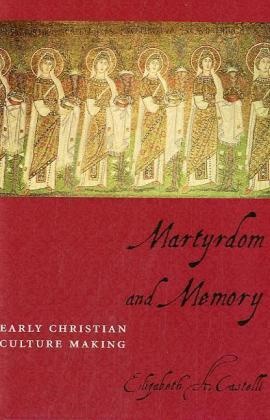Read more
Martyrs are produced, Elizabeth Castelli suggests, not by the lived experience of particular historical individuals but by the stories that are later told about them. And the formulaic character of stories about past suffering paradoxically serves specific theological, cultural, or political ends in the present. Martyrdom and Memory explores the central role of persecution in the early development of Christian ideas, institutions, and cultural forms and shows how the legacy of Christian martyrdom plays out in today's world.
In the pre-Constantinian imperial period, the conflict between Roman imperial powers and the subject Christian population hinged on competing interpretations of power, submission, resistance, and victory. This book highlights how both Roman and Christian notions of law and piety deployed the same forms of censure and critique, each accusing the other of deviations from governing conventions of gender, reason, and religion. Using Maurice Halbwachs's theoretical framework of collective memory and a wide range of Christian sources -- autobiographical writings, martyrologies and saints'lives, sermons, art objects, pilgrimage souvenirs, and polemics about spectacle -- Castelli shows that the writings of early Christians aimed to create public and ideologically potent accounts of martyrdom. The martyr's story becomes a "usable past" and a "living tradition" for Christian communities and an especially effective vehicle for transmitting ideas about gender, power, and sanctity.
An unlikely legacy of early Christian martyrdom is the emergence of modern "martyr cults" in the wake of the 1999 shootings at Columbine High School. Focusing specifically on the martyr cult associated with one of the victims, Martyrdom and Memory argues that the Columbine story dramatically expresses the ongoing power of collective memory constructed around a process of rendering tragic suffering redemptive and meaningful. In the wake of Columbine and other contemporary legacies of martyrdom's ethical ambivalence, the global impact of Christian culture making in the early twenty-first century cannot be ignored. For as the last century's secularist hypothesis sits in the wings, "religion" returns to center stage with one of this drama's most contentious yet riveting stars: the martyr.
List of contents
Collective Memory and the Meanings of the Past
Performing Persecution, Theorizing Martyrdom
The Martyr's Memory: Autobiography and Self-Writing in Ignatius, Perpetua, and Pionius
Martyrdom and the Spectacle of Suffering
Layers of Verbal and Visual Memory: Commemorating Thecla the Protomartyr
Religion as a Chain of Memory: Cassie Bernall of Columbine High and the Contemporary American Legacy of Early Christian Martyrdom
About the author
Elizabeth Castelli
Summary
Suggests that Martyrs are produced, not by lived experience of particular historical individuals but by the stories that are later told about them. This work explores the central role of persecution in the early development of Christian ideas, institutions, and cultural forms and shows how the legacy of Christian martyrdom plays out in the world.

